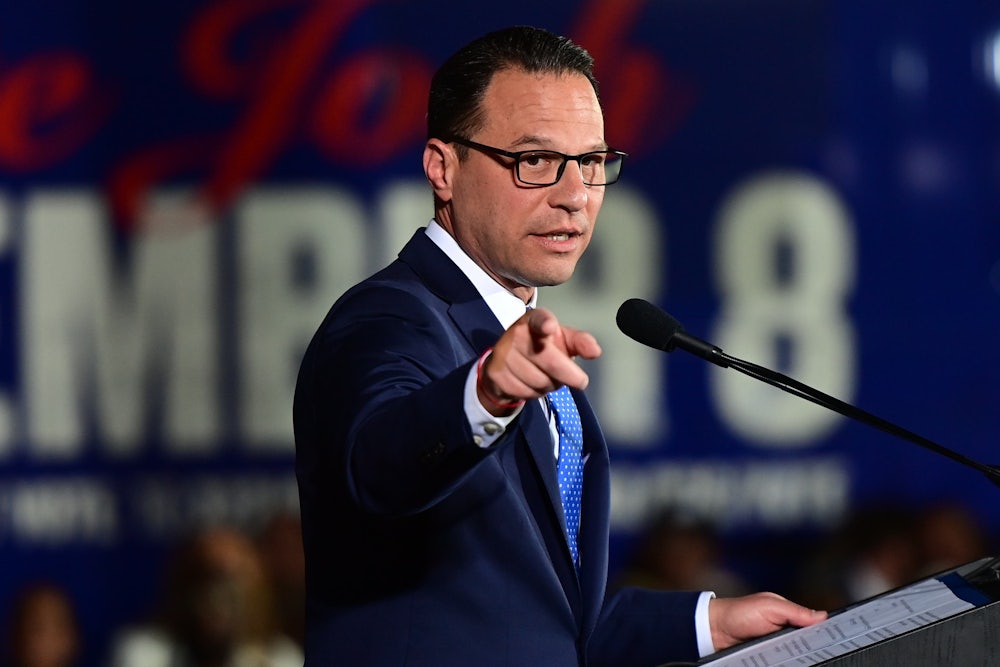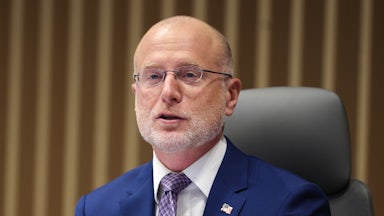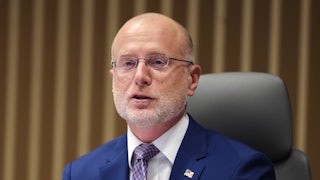After nearly 30 years, the state of Pennsylvania is ending its contract with Real Alternatives—an anti-abortion organization that provides funding to what are known as “crisis pregnancy centers.” Just hours after signing the overdue 2023–2024 budget on August 3, Governor Josh Shapiro announced that his administration will be cutting ties with the misleading nonprofit, letting the state’s contract expire by the end of the year. The move is part and parcel with the post-Dobbs political landscape, which finds Democratic politicians treading the favorable terrain of popular reproductive rights positions. It also ends an arrangement in which taxpayer largesse was flowing to a firm that could not be said to be acting in the public interest.
Real Alternatives has fed itself well at the Keystone State’s taxpayer trough. The firm, which funds 27 crisis pregnancy centers throughout the state, has received more than $134 million total in taxpayer funding since it became the sole contractor for the Department of Human Services’ Alternatives to Abortion Services program in the 1990s. Just last year, Real Alternatives received $6.2 million from the 2022–2023 state budget and an additional $1 million from Temporary Assistance for Needy Families, or TANF, which is intended for pregnant people and children living in poverty. The Harrisburg-based organization was also set to receive an additional $2 million from the state’s proposed budget before Shapiro announced his decision to end their contract.
According to the American College of Obstetricians and Gynecologists, crisis pregnancy centers misrepresent themselves as licensed medical clinics but do not provide adequate sexual and reproductive health care services. In fact, they’re not even staffed by actual medical professionals. Instead, these mostly religiously affiliated facilities use misleading and deceptive practices to dissuade pregnant people from seeking access to abortion.
Some of these tactics include lying about the risks associated with abortion, using ultrasounds and images of embryos and fetuses to “emotionally manipulate” pregnant people into changing their minds, and overestimating a pregnant person’s gestational age to deceive them into thinking they’re too far along to legally obtain an abortion.
Pennsylvania is by no means the only state to have either supported or funded crisis pregnancy centers. Nearly half of the states in the U.S. have laws supporting these facilities, with nearly a dozen states funding them directly. By letting this contract with Real Alternatives expire, Shapiro—and by extension, Pennsylvania—is taking the lead as one of only a handful of states to crack down on allocating state funding to these predatory facilities.
“For decades, taxpayer dollars have gone to fund Real Alternatives. My Administration will not continue that pattern – we will ensure women in this Commonwealth receive the reproductive health care they deserve,” Shapiro said in a statement.
Advocates for abortion and reproductive rights in the state have long condemned using taxpayer money to fund crisis pregnancy centers, accusing the nonprofit of spreading misinformation, delaying medical care, and misusing state funds. Now they’re praising the Shapiro administration’s decision and celebrating it as a win.
“I think this is an extraordinary accomplishment,” Tara Murtha, the director of strategic communications at the Women’s Law Project, told The New Republic. “It was absolutely perverse that Pennsylvanians, who overwhelmingly support abortion access by the way, were forced to fund an industry that exploits and endangers us to the tune of tens of millions of dollars.” Murtha says Real Alternatives should never have been allowed to “pinch from TANF funds” and divert money away from pregnant people in need in the first place.
“In a world where these centers outnumber abortion providers nine to one, the impact is significant,” Signe Espinoza, the executive director at Planned Parenthood Pennsylvania Advocates, told The New Republic. “Our state is saying that no longer will they publicly fund and use taxpayer dollars to organizations that first and foremost do not provide sexual reproductive health care.” According to Espinoza, crisis pregnancy centers not only manipulate pregnant people into carrying to term, but they don’t even provide prenatal care or refer people to legitimate health clinics that offer a “full range” of reproductive health services. In many cases, these centers will even mislead patients away from taking advantage of the full range of care that is readily available to them.
“I think a lot of people don’t understand that the CPC industry functions as a barrier to all forms of legitimate medical care, not solely abortion, although that is their primary mission,” Murtha says, adding that “it feels great” that those who have spent years sounding the alarm on the harms and dangers of crisis pregnancy centers ”have all finally been heard.”
While Murtha and Espinoza both praise this decision as a step in the right direction, they say it is still only a small piece of a larger puzzle that still needs to be pieced together. Murtha notes that while the actual impact this will have on abortion access “remains to be seen” since only 28 out of the more than 150 crisis pregnancy centers in Pennsylvania were part of the state-funded network, “what we do know right away is that reallocating the funds will increase access to legitimate medical care overall, whether that is abortion or someone seeking prenatal care.”
Dr. Val Arkoosh, who heads Pennsylvania’s Department of Human Services, has already signaled his intention to find other women’s health providers in the state to fund instead of Real Alternatives, emphasizing the Shapiro administration’s purported commitment to “unbiased, medically accurate” reproductive health care and counsel. However, it is still unknown whether or not the $1 million in TANF funds will be redirected to pregnant people and children living in poverty.
Moving forward, Murtha says organizations like the Women’s Law Project must continue to hold crisis pregnancy centers accountable for their deceptive practices and combat misinformation by expanding access to comprehensive sexual education to help “fill in these gaps” that make people “vulnerable” to these predatory facilities.
“What we need in this moment, as we continue to live in this post-Dobbs world, is to ensure that all of our leaders in positions of power are protecting sexual reproductive health care,” Espinoza says, adding that her organization is also focused finding ways to expand abortion access.
“Despite the fact that abortion is legal in the state, it is certainly not accessible,” she says. Following the passage of Roe v. Wade in 1973, there were around 145 abortion providers in Pennsylvania. Now, 50 years later, there are only 18 freestanding abortion providers in the state, with some hospitals offering a limited range of abortion care services. And while abortion is still legal up until 24 weeks of gestation, there are restrictions in place that act as barriers to care, which Espinoza hopes to eliminate, such as the 24-hour waiting period and misleading state-mandated counseling pregnant people are required to endure before they can legally obtain an abortion.
“We can’t stress enough that we need to move quicker to ensure that sexual reproductive health care is accessible to everybody who needs it,” she says.










